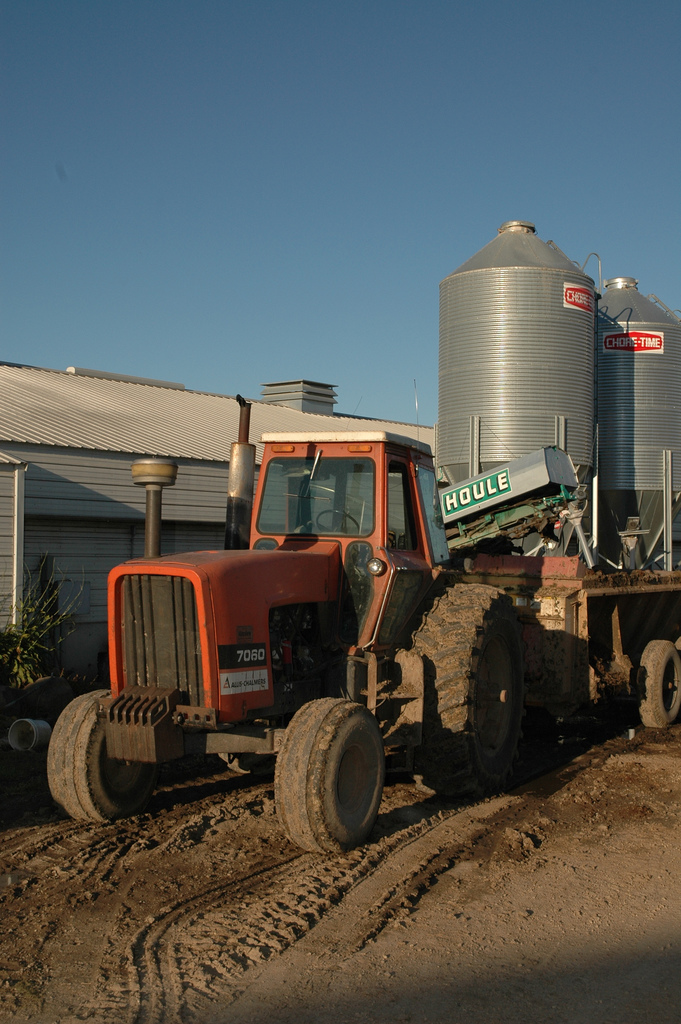
Tractor with a manure spreader on a farm. Image via Wikimedia Commons
A long winter and a wet spring are bringing the perfect storm of manure management to the Great Lakes region, experts say.
That’s because manure used as fertilizer on farms combines with water and flows into waterways.
The waste from animals at large farms is stored over the winter for up to six months before it is spread as fertilizer in the spring, said Dave Drullinger, an environmental quality analyst at the Michigan Department of Environmental Quality. If it isn’t stored, the manure would run into the water along with the melted snow or rainwater. The long winter and recent extreme rain has farmers worried about running out of storage space, said Drullinger.
But the wet conditions prevent applying manure to the fields, he said.
The excessive rains changed the regular planting season, also delaying the spreading of manure, said Scott Piggott, manager of the Agricultural Ecology Department at the Michigan Farm Bureau. Usually planting occurs in April. This year many Michigan farmers could not get on the fields until June.
Farmers who got the manure out were forced to put it in soils saturated with water, which leads to run-off, said Drullinger. That’s when soil fully saturated with water cannot absorb more and additional water runs off into waterways.
Right now the fields are saturated, said Lynn Henning, who works to promote awareness about water for the Sierra Club of Michigan.
Farmers have about a two-week window to get the crops out on the field, otherwise the crops are not covered by crop insurance, said Henning.
“It will be a mad rush to get as much manure on and plant in the next two weeks and we don’t feel they will taking adequate measures to prevent run-off,” she said.
The dry past week, however, seems promising to Piggott.
“They will make it in time,” he said.
Farmers with lots of livestock in what are known at Confined Animal Feeding Operations obtain permits from the state, Piggott said.
The permits prohibit waste from draining into waterways except under unexpected conditions, when if they have followed protocol according to the permit, they will not be penalized, Drullinger said.
But no one has exceeded any limit, Piggott said.
The farmers who do not get their crops into the ground over the next couple of weeks get a small percentage of what the crop would have yielded. If the farmers do risk putting the crop in the ground and it fails to yield anything, they get a higher percentage from the crop insurance, said Piggott.
Similar problems are occurring in Ohio. The state had the wettest April in more than a century, said John Kessler, assistant chief for the division of soil and water resources at the Ohio Department of Natural Resources (DNR).
The planting season has been much delayed.
“Only about 10 percent of soybeans and corn have been put into the ground,” he said.
Is there a solution?
“Go back to the pasture-based system, where you put the animals out on the land. You don’t need tractors, you don’t need fossil fuels and nature takes care of the manure out in the fields,” said Henning.
A pasture-based system is one where cattle are reared out in the open with pasture as a main part of their diet, instead of in an indoor confinement.
There are ways to inject liquid manure into the soil without disturbing it, said Drullinger. There are also several different designs for plows, which allow manure to be put into the ground with minimal damage, but the equipment is expensive and not easily available, he said.
Another method to prevent run-off is by having vegetation and planting trees on the ground.
“The area we farm in used to be forests in Michigan,” said Drullinger.
The forests absorbed the water, which prevented it from running into waterways. When the trees are removed and the field is plowed, the bare fields increase the chance of run-off, he said. Leaving some plant stubble or vegetation is a good practice. Having vegetation on land in spring keeps it insulated, which leads to faster drying of fields.
But there is a conflict.
The vegetation prevents run-off but also prevents easy drying of the ground, he said.
Farmers have been working together, said Piggott. They give the stored manure to another farmer if their own farm is too wet and a neighbor’s is drier.
In Ohio, the Department of Natural Resources offers up to $500 to help farmers move the manure to other farms that have greater storage space or can use the manure, said Kessler.
“The weather pattern this year is different so we are being tested to see if we can handle weather extremes,” he said.
